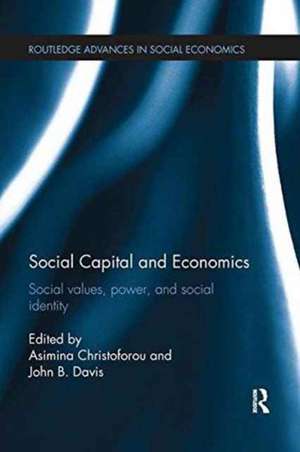Social Capital and Economics: Social Values, Power, and Social Identity: Routledge Advances in Social Economics
Editat de Asimina Christoforou, John Davisen Limba Engleză Paperback – 11 noi 2016
Social capital can be understood in terms of social norms and networks. It manifests itself in patterns of trust, reciprocity, and cooperation. The authors argue that the degree to which and the different ways in which people exhibit these distinctively social behaviours depend on how norms and networks elicit their values, reflect power relationships, and draw on their social identities. This volume accordingly adopts a variety of different concepts and measures that incorporate the variety of contextually-specific factors that operate on social capital formation. In addition, it adopts an interdisciplinary outlook that combines a wide range of social science disciplines and methods of social research. Our objective is to challenge standard rationality theory explanations of norms and networks which overlook the role of values, power, and identity.
This volume appeals to researchers and students in multiple social sciences, including economics, sociology, political science, social psychology, history, public policy, and international relations, that employ social capital concepts and methods in their research. It can be seen as a set of new extensions of social capital theory in connection with its themes of social values, power, and identity that would advance the scholarly literature on social norms and networks and their impact on social change and public welfare.
| Toate formatele și edițiile | Preț | Express |
|---|---|---|
| Paperback (1) | 489.26 lei 43-57 zile | |
| Taylor & Francis – 11 noi 2016 | 489.26 lei 43-57 zile | |
| Hardback (1) | 1172.23 lei 43-57 zile | |
| Taylor & Francis – mai 2014 | 1172.23 lei 43-57 zile |
Din seria Routledge Advances in Social Economics
-
 Preț: 386.77 lei
Preț: 386.77 lei -
 Preț: 310.08 lei
Preț: 310.08 lei - 18%
 Preț: 998.77 lei
Preț: 998.77 lei -
 Preț: 284.78 lei
Preț: 284.78 lei -
 Preț: 395.90 lei
Preț: 395.90 lei -
 Preț: 467.44 lei
Preț: 467.44 lei -
 Preț: 414.70 lei
Preț: 414.70 lei -
 Preț: 493.34 lei
Preț: 493.34 lei -
 Preț: 469.34 lei
Preț: 469.34 lei - 17%
 Preț: 257.68 lei
Preț: 257.68 lei -
 Preț: 389.38 lei
Preț: 389.38 lei -
 Preț: 466.49 lei
Preț: 466.49 lei - 17%
 Preț: 219.59 lei
Preț: 219.59 lei -
 Preț: 482.74 lei
Preț: 482.74 lei -
 Preț: 487.44 lei
Preț: 487.44 lei -
 Preț: 415.67 lei
Preț: 415.67 lei - 18%
 Preț: 1002.63 lei
Preț: 1002.63 lei -
 Preț: 468.36 lei
Preț: 468.36 lei - 15%
 Preț: 425.62 lei
Preț: 425.62 lei - 19%
 Preț: 269.39 lei
Preț: 269.39 lei - 13%
 Preț: 337.39 lei
Preț: 337.39 lei - 15%
 Preț: 428.00 lei
Preț: 428.00 lei -
 Preț: 447.51 lei
Preț: 447.51 lei -
 Preț: 445.22 lei
Preț: 445.22 lei -
 Preț: 384.27 lei
Preț: 384.27 lei - 26%
 Preț: 848.93 lei
Preț: 848.93 lei - 18%
 Preț: 1387.62 lei
Preț: 1387.62 lei - 18%
 Preț: 1060.25 lei
Preț: 1060.25 lei
Preț: 489.26 lei
Nou
Puncte Express: 734
Preț estimativ în valută:
93.62€ • 97.99$ • 77.92£
93.62€ • 97.99$ • 77.92£
Carte tipărită la comandă
Livrare economică 31 martie-14 aprilie
Preluare comenzi: 021 569.72.76
Specificații
ISBN-13: 9781138226777
ISBN-10: 1138226777
Pagini: 290
Ilustrații: 8
Dimensiuni: 156 x 234 mm
Greutate: 0.45 kg
Ediția:1
Editura: Taylor & Francis
Colecția Routledge
Seria Routledge Advances in Social Economics
Locul publicării:Oxford, United Kingdom
ISBN-10: 1138226777
Pagini: 290
Ilustrații: 8
Dimensiuni: 156 x 234 mm
Greutate: 0.45 kg
Ediția:1
Editura: Taylor & Francis
Colecția Routledge
Seria Routledge Advances in Social Economics
Locul publicării:Oxford, United Kingdom
Public țintă
Postgraduate and UndergraduateCuprins
Part 1: Introduction Social Capital: Social Values, Power, and Social Identity Part 2: Old problems, new questions Part 3: Alternative theoretical frameworks Part 4: Social segregation and social capital Part 5: The third sphere and the social economy
Recenzii
‘This timely volume, which pulls together cutting-edge knowledge from diverse fields and multiple countries, brings new life to the very important notion of social capital – a critical resource that communities and groups can utilize strategically for mutually beneficial collective action. The authors admirably demonstrate how social capital can help serve a wide variety of shared objectives in diverse circumstances, provided that it is rigorously defined, carefully contextualized, and appropriately combined with other resources. Policy practitioners and academic researchers as well as graduate and undergraduate students will find this volume a very useful resource.’ — Anirudh Krishna, Professor of Public Policy and Political Science, Duke University, USA
‘Christoforou, Davis and their collaborators give us a welcomed and timely volume that engages important, but under-investigated facets of social capital theory. The interdisciplinary, contextually defined, and decidedly social approach woven throughout this well-edited collection reorients social capital theorizing in important and analytically useful ways. By tying social capital accumulation and utilization to the interaction of power relations, social identities, and values within historically-specific contexts the contributors offer a refreshing alternative to overly economistic and structural-functionalist approaches. Social Capital and Economics helps all of us better understand how durable inequalities and enduring social conflicts influence who has social capital and what difference that makes.’ —
Bob Edwards, Professor of Sociology, East Carolina University, USA
‘Christoforou, Davis and their collaborators give us a welcomed and timely volume that engages important, but under-investigated facets of social capital theory. The interdisciplinary, contextually defined, and decidedly social approach woven throughout this well-edited collection reorients social capital theorizing in important and analytically useful ways. By tying social capital accumulation and utilization to the interaction of power relations, social identities, and values within historically-specific contexts the contributors offer a refreshing alternative to overly economistic and structural-functionalist approaches. Social Capital and Economics helps all of us better understand how durable inequalities and enduring social conflicts influence who has social capital and what difference that makes.’ —
Bob Edwards, Professor of Sociology, East Carolina University, USA
Descriere
This volume provides a collection of critical new perspectives on social capital theory by examining how social values, power relationships, and social identity interact with social capital. This book seeks to extend this theory into what have been largely under-investigated domains, and, at the same time, address long-standing, classic questions in the literature concerning the forms, determinants and consequences of social capital.
















